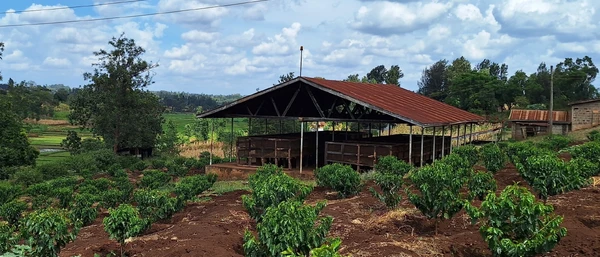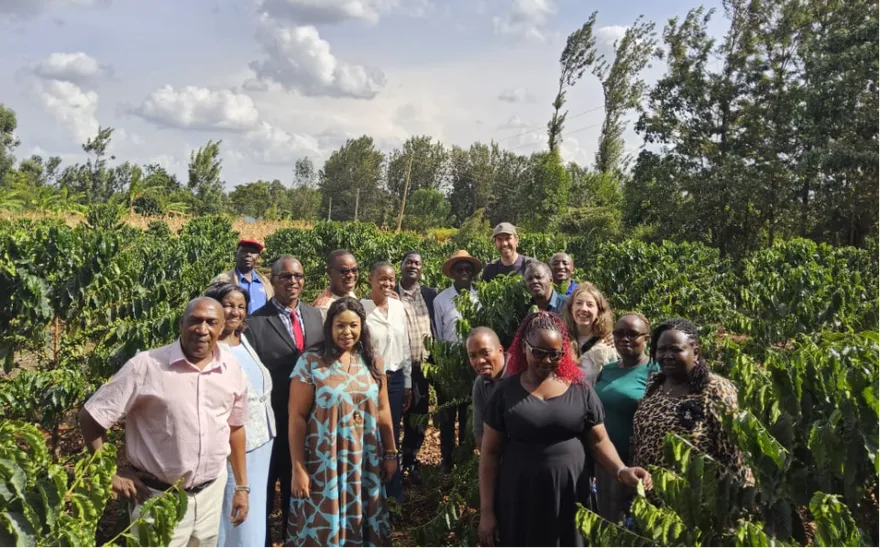
Tchibo expands its coffee programme: Kenya becomes seventh country
Hamburg,
- Kenya is the seventh country in the Tchibo coffee programme.
- The objectives of the coffee programme in Kenya are to adapt to climate change, increase productivity and quality, diversify incomes and involve women and young people.
- Measures: Training, strengthening demo farms and tree nurseries and quality assurance.
Tchibo has clearly communicated its goal: From 2027, only responsibly sourced coffees are to be offered. The Hamburg-based coffee roaster is now expanding its coffee programme once again: in addition to projects in six countries of origin (including Brazil, Guatemala and Vietnam), Kenya will be added as the seventh country. The new coffee project in the Kirinyaga region on Mount Kenya builds on a long local Tchibo history: The first major Mount Kenya project started back in 2010, and Tchibo is working on the ground with local partners and cooperatives to make coffee cultivation more resilient and strengthen the livelihoods of farmers.
Why Kenya
Kenya is one of the best-known coffee origins in East Africa. The volcanic soil and altitude around Mount Kenya offer excellent conditions for the coffee plant. At the same time, the challenges are clear: climate change, soil erosion, loss of biodiversity and low farm incomes. This is precisely where the project in Kirinyaga comes in, with the aim of increasing productivity and quality, diversifying income and specifically involving women and young people.
Project partners and approach
In Kirinyaga, Tchibo works together with the Inoi Farmer Cooperative Limited, supported by Rainforest Alliance and Ibero Kenya (NKG).

Measures on site
The Inoi cooperative has around 5,000 active members. In particular, youth and women's groups are to be supported. Specifically, the project trains so-called "lead farmers" and employees of the cooperative. They then pass on the knowledge they have learned to neighbours and other farmers. That is exactly what it means:
- Training on sustainable cultivation practices, composting, organic fertilisers and coffee processing.
- Establishment and maintenance of tree nurseries for coffee seedlings as well as shade and fruit trees.
- Expansion and improvement of existing demo farms to make regenerative practices visible and increase productivity.
- Quality training for wet processing in the washing stations during the current harvest season.
- Greater involvement of women and young people.
Project status
The official project launch in June brought together almost 1,000 coffee farmers, youth and women's groups as well as relevant stakeholders in the coffee sector. In August, farmer training sessions were held in cooperation with the Kenyan Coffee Research Institute (CRI). In addition, over 2,000 soil samples were recently collected from farmers and analysed. Quality training for employees of the cooperative on wet processing and regular refresher training for the lead farmers are currently scheduled for harvest time.
Voices on the project
"Our collaboration with the Inoi cooperative and other partners such as Tchibo reflects the revitalised interest of Kenyan communities in coffee farming. This collaboration will contribute to a sustainable increase in coffee productivity, improving people's livelihoods and protecting the environment." William, Ibero Kenya (NKG)
Background: The Tchibo coffee programme
Together with farmers and strong local partners, Tchibo develops suitable programmes for the respective country of origin. The aim is that by 2027, all coffee purchased by Tchibo will come from regions in which environmentally friendly and socially responsible cultivation practices are continuously being developed. The effectiveness of the measures is monitored and verified by the independent organisation Enveritas. Since its launch, well over 13,000 farms in nine countries (six countries with a coffee programme plus three countries with a partner programme) have been reached: in Brazil, Guatemala, Honduras, Colombia, Tanzania, Vietnam, Ethiopia, Uganda and Indonesia.
More information for journalists:
Sandra Coy, Sprecherin Unternehmensverantwortung & Qualität
Phone: +49 40 6387-2818
E-Mail: sandra.coy@tchibo.de
About Tchibo:
Tchibo stands for a unique business model. The company uses its multi-channel distribution system to offer coffee and the Cafissimo and Qbo single-serve system, along with weekly changing non food ranges. In eight countries, Tchibo operates about 900 Tchibo shops and national online shops. The company is also represented in around 16,000 Depots at third-party retail outlets throughout Germany, of which around 8,000 also sell consumer goods. Founded in Hamburg in 1949, the family-owned company generated sales of 3.36 billion euros in 2024 with 10,452 employees worldwide. Tchibo is the roasted coffee market leader in Austria, the Czech Republic, Germany and Hungary and one of the leading e-commerce companies in Europe. Its sustainable business policies have earned Tchibo multiple national and international awards.